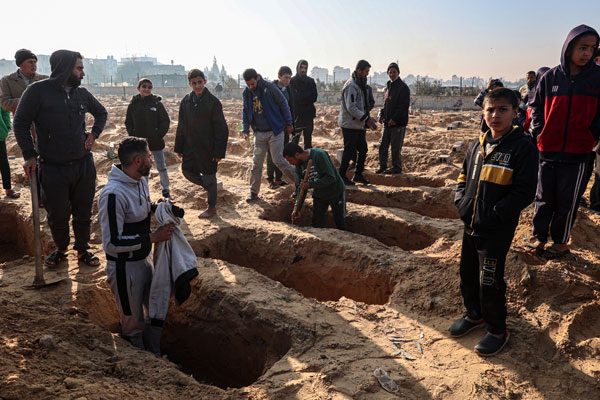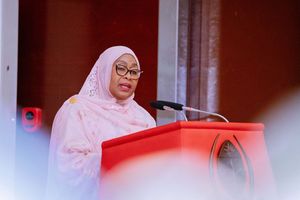Israel occupation 'affront to justice', UN court told

Palestinians dig graves for victims killed in overnight Israeli air strikes at a cemetery in east Khan Yunis in the southern Gaza Strip on February 26, 2024, amid ongoing battles between Israel and the militant Hamas movement. PHOTO / AFP
What you need to know:
- The International Court of Justice entered its last day of week-long hearings after a request from the United Nations, with an unprecedented 52 countries giving their views on Israel's occupation.
- The UN has asked the ICJ to hand down an "advisory opinion" on the "legal consequences arising from the policies and practices of Israel in the Occupied Palestinian Territory, including East Jerusalem".
The League of Arab States on Monday called Israel's occupation of Palestinian territories an "affront to international justice", saying failure to end it amounted to "genocide".
The International Court of Justice entered its last day of week-long hearings after a request from the United Nations, with an unprecedented 52 countries giving their views on Israel's occupation.
"This prolonged occupation is an affront to international justice," the 22 Arab-country bloc's representative told judges in The Hague.
"The failure to bring it to an end has led to the current horrors perpetrated against the Palestinian people, amounting to genocide," Abdel Hakim El-Rifai said.
Most speakers during the hearings have demanded that Israel end its occupation, which came after a six-day Arab-Israeli war in 1967.
But last week the United States said Israel should not be legally obliged to withdraw without taking its "very real security needs" into account.
Speakers on Monday warned a prolonged occupation posed an "extreme danger" to stability in the Middle East and beyond.
"If left unchecked, it runs the risk of not only threatening regional, but also global peace and security," Turkey's representative Ahmet Yildiz said.
The UN has asked the ICJ to hand down an "advisory opinion" on the "legal consequences arising from the policies and practices of Israel in the Occupied Palestinian Territory, including East Jerusalem".
The court will probably deliver its opinion before the end of the year but it is not binding on anyone.
Israel is not taking part in the oral hearings. It submitted a written contribution, in which it described the questions the court had been asked as "prejudicial" and "tendentious".
The hearings began a week ago with three hours of testimony from Palestinian officials, who accused the Israeli occupiers of running a system of "colonialism and apartheid".
The hearing before the court is separate from a case brought by South Africa against Israel for alleged genocide during its current offensive in Gaza.
In that case, the ICJ ruled that Israel should do everything in its power to prevent genocidal acts in Gaza and allow in humanitarian aid.
The war in Gaza began after Hamas militants attacked southern Israel on October 7, which resulted in the deaths of around 1,160 people, mostly civilians, according to an AFP tally based on Israeli figures.
Israeli's retaliatory military offensive in Gaza has so far killed at least 29,782 people, most of them women and children, according to the territory's Hamas-run health ministry.





